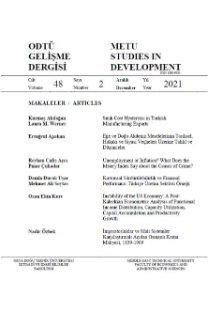2002 Sonrası Türkiye ekonomisinin performansı: Karşılaştırmalı bir analiz
The performance of Turkish economy after 2002: A comparative analysis
___
- CÖMERT, H. ve UĞURLU, E. (2015), "The Impacts of the 2008 Global Financial Crisis on Developing Countries: The Case of 15 Most-Affected Countries", IDEAs Working Papers, 03/2015.
- KARA, H., ve SARIKAYA, C. (2014), "Current Account Deficit in Turkey: Cyclical or Structural?", In Koç University-TUSIAD Economic Research Forum Working Papers (No. 1420), Koc University-TUSIAD Economic Research Forum.
- KARAGÖL, E. T. (2013), The Turkish Economy During the Justice and Development Party Decade, Insight Turkey, 15(4), 115-129.
- KHRAMOV, V., ve RIDINGS LEE, J. (2013), The Economic Performance Index (EPI): an Intuitive Indicator for Assessing a Country's Economic Performance Dynamics in an Historical Perspective, IMF Working Paper No. 13/214.
- SETTERFIELD, M. (2009), "An index of Macroeconomic Performance. International Review of Applied Economics", 23(5), 625-649.
- TELLİ, Ç., VOYVODA, E., ve YELDAN, E. (2006), "Modeling General Equilibrium for Socially Responsible Macroeconomics: Seeking for the Alternatives to Fight Jobless Growth in Turkey", Middle East Technical University Studies in Development, 33(2), 255-293.
- YELDAN, E., and ERCAN, H. (2011), Growth, Employment Policies and Economic Linkages: Turkey, International Labour Organization.
- ISSN: 1010-9935
- Yayın Aralığı: Yılda 3 Sayı
- Başlangıç: 2018
- Yayıncı: ODTÜ İİBF
Do regional trade agreements actually increase Turkey's foreign trade?
Elif AKBOSTANCI, Merve Mavuş KÜTÜK
Time poverty and the poverty of economics
The role of the state in escaping the middle-income trap: the case for smart industrial policy
Osmanlı devleti ve Avrupa devletlerinde tağşişler ve nedenleri
KAMİL KIVANÇ KARAMAN, Şevket PAMUK
The impact of intangible assets on the productivity of manufacturing firms in Turkey
Yeşim ÜÇDOĞRUK GÜREL, YILMAZ KILIÇASLAN
Dynamic analysis of employment and domestic value added generated by foreign demand in Turkey
Sevinç MIHÇI, Arzu Akkoyunlu WİGLEY, BAŞAK DALGIÇ
Do regional trade agreements actually increase Turkey's foreign trade?
Merve Mavuş KÜTÜK, ELİF AKBOSTANCI ÖZKAZANÇ
The world into the 21st century: Globalization, market capitalism and sustainability
2002 Sonrası Türkiye ekonomisinin performansı: Karşılaştırmalı bir analiz
